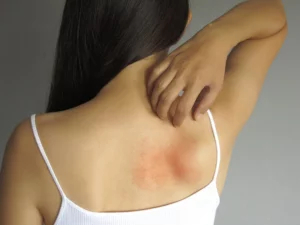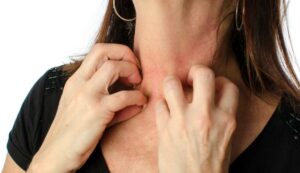While hot flashes and mood swings are commonly associated with menopause, some women may also experience unexpected challenges, such as hives. Menopausal hives can be a perplexing and discomforting symptom, but understanding their triggers and exploring effective treatment options can make this phase more manageable. In this blog, we delve into the world of menopausal hives, providing insights, and menopause hives treatment tips.
Contents
What Causes Hives During Menopause?
 Hives during menopause can be attributed to a variety of factors, often related to the hormonal fluctuations that characterize this life stage. While the exact cause can vary from person to person, some common contributors include:
Hives during menopause can be attributed to a variety of factors, often related to the hormonal fluctuations that characterize this life stage. While the exact cause can vary from person to person, some common contributors include:
- Hormonal Changes: The primary trigger for menopausal hives is the fluctuation in hormone levels, particularly a decline in estrogen. Estrogen has a stabilizing effect on mast cells, which play a crucial role in the immune system. When estrogen levels decrease during menopause, mast cells may become more reactive, leading to the release of histamine and the development of hives.
- Stress and Anxiety: Menopause is a time of significant life changes, and the associated stress and anxiety can exacerbate hives. Stress activates the body’s immune response, releasing histamine and potentially triggering or worsening hives in menopausal women.
- Heat and Sweating: Hot flashes, a common symptom of menopause, can lead to increased body heat and sweating. This combination may contribute to the development of hives, as the skin reacts to the heat and perspiration.
- Medications: Some women may be prescribed hormone replacement therapy (HRT) or other medications during menopause. Certain medications can have side effects, including allergic reactions that manifest as hives.
- Existing Allergies: Menopausal women may find that pre-existing allergies become more pronounced during this time. Allergic reactions can trigger hives, and menopause-related hormonal changes may heighten sensitivity to allergens.
- Food Triggers: Changes in metabolism and hormonal fluctuations can sometimes lead to new sensitivities to certain foods. In some cases, dietary factors, such as specific allergens or additives, can trigger hives.
It’s essential for women experiencing menopausal hives to consult with a healthcare professional for a thorough evaluation. Identifying the specific triggers for hives can help tailor an effective treatment plan to manage symptoms and improve overall well-being.
What Are Some Effective Menopause Hives Treatment Options?
Menopause hives treatment involves a combination of lifestyle changes, self-care practices, and, in some cases, medical interventions. Here are some effective menopause hives treatment options:
Antihistamines
Over-the-counter antihistamines are a common and effective first-line treatment for menopausal hives. These medications work by blocking the action of histamine, a substance released in the body during an allergic reaction. Non-sedating antihistamines are often preferred for daytime use to avoid drowsiness. Regular use of antihistamines can help alleviate itching and reduce the frequency and severity of hives.
Avoiding Triggers
Identifying and avoiding triggers is a key component of managing menopausal hives. This may involve keeping a detailed diary to track activities, foods, or environmental factors that coincide with the onset of hives. Once triggers are identified, proactive steps can be taken to minimize exposure. This might include dietary changes, stress management, and environmental modifications to create a more hive-friendly lifestyle.
Cooling Measures
Hot flashes and increased body heat can exacerbate hives during menopause. To manage this, wearing lightweight, breathable clothing and using fans or air conditioning can help maintain a cooler body temperature. This can be particularly beneficial in reducing the frequency and intensity of hives triggered by heat. Additionally, avoiding hot baths or showers and opting for lukewarm water can prevent further irritation to the skin.
Stress Management
 Stress is a known trigger for hives, and menopause itself can be a stressful life transition. Incorporating stress-reduction techniques into daily life, such as deep breathing exercises, meditation, yoga, or mindfulness practices, can have a positive impact on both emotional well-being and the frequency of hives. Finding effective stress management strategies is essential for women experiencing menopausal hives, as it addresses both the emotional and physiological aspects of this condition.
Stress is a known trigger for hives, and menopause itself can be a stressful life transition. Incorporating stress-reduction techniques into daily life, such as deep breathing exercises, meditation, yoga, or mindfulness practices, can have a positive impact on both emotional well-being and the frequency of hives. Finding effective stress management strategies is essential for women experiencing menopausal hives, as it addresses both the emotional and physiological aspects of this condition.
Topical Treatments
In addition to oral medications, topical treatments can provide targeted relief for menopausal hives. Calamine lotion, known for its soothing properties, can be applied directly to affected areas to alleviate itching and reduce inflammation. Over-the-counter hydrocortisone cream is another option, providing anti-inflammatory effects. However, it’s important to use these topical treatments as directed by a healthcare professional to avoid potential side effects. While these remedies offer temporary relief, they are often part of a broader treatment plan that may include other interventions.
Dietary Changes
Dietary modifications can play a significant role in managing menopausal hives. Keeping a food diary to track potential triggers and consulting with a dietitian can help identify and eliminate specific foods that may be contributing to hives. In some cases, women may develop new sensitivities during menopause, and a well-balanced diet that supports overall skin health can be beneficial. Antioxidant-rich foods, omega-3 fatty acids, and hydration are essential elements to consider when making dietary adjustments.
Prescription Medications
For cases of persistent or severe hives, prescription medications may be recommended by a healthcare professional. Stronger antihistamines, corticosteroids, or other immunomodulating medications can be prescribed to address inflammation and immune system reactions. These medications are typically used for short periods due to potential side effects, and their usage requires careful monitoring by a healthcare provider to ensure effectiveness and safety.
Allergen Management
If allergies are identified as contributing to hives, managing exposure to allergens becomes crucial. This may involve making changes in the home environment, such as using air purifiers or removing potential allergens. Identifying specific allergens through testing and then taking steps to minimize contact can significantly reduce the frequency and intensity of hives. An allergist can play a key role in diagnosing and managing allergic triggers.
Consulting a Specialist
When hives persist or are particularly severe, seeking the expertise of a specialist such as an allergist or dermatologist is advisable. These healthcare professionals can conduct more specialized testing to pinpoint triggers and recommend targeted treatment options. A comprehensive approach that combines lifestyle modifications, medications, and expert guidance can provide women with a personalized and effective strategy for managing menopausal hives. Regular communication with healthcare providers ensures ongoing support and adjustments to the treatment plan as needed.
It’s crucial for women experiencing menopausal hives to work closely with their healthcare providers to determine the most effective and personalized treatment plan for their specific situation. Lifestyle modifications and a proactive approach to managing triggers can significantly improve the overall quality of life during this phase.
How Do You Get Rid Of Hormonal Hives?
 Getting rid of hormonal hives involves addressing the root cause of the condition, which is often linked to hormonal fluctuations during menopause. Here are a few strategies specifically focused on managing and alleviating hormonal hives:
Getting rid of hormonal hives involves addressing the root cause of the condition, which is often linked to hormonal fluctuations during menopause. Here are a few strategies specifically focused on managing and alleviating hormonal hives:
Hormone Replacement Therapy (HRT)
Hormone replacement therapy, under the guidance of a healthcare professional, can help stabilize hormonal fluctuations associated with menopause. By supplementing estrogen levels, HRT may mitigate the severity and frequency of hormonal hives. However, the decision to pursue HRT should be individualized, considering the risks and benefits, and monitored closely for effectiveness.
Balanced Diet and Supplements
Adopting a balanced diet rich in nutrients that support skin health can contribute to managing hormonal hives. Omega-3 fatty acids, found in fish, flaxseeds, and walnuts, have anti-inflammatory properties that may help reduce skin reactions. Additionally, vitamin D supplements, as recommended by a healthcare provider, can support overall skin health.
Regular Exercise
Regular physical activity has been shown to positively impact hormonal balance and alleviate stress, which can, in turn, benefit hormonal hives. Incorporating moderate exercise into a daily routine, such as brisk walking, swimming, or yoga, can contribute to overall well-being and potentially reduce the severity of hives.
Adequate Sleep
Quality sleep is crucial for hormonal regulation and overall health. Establishing a regular sleep routine and creating a comfortable sleep environment can contribute to hormonal balance and reduce the likelihood of hives. Prioritize getting seven to eight hours of uninterrupted sleep each night.
Herbal Supplements
Some women find relief from hormonal symptoms, including hives, through the use of herbal supplements. Evening primrose oil, black cohosh, and red clover are examples of herbs that some individuals use to manage menopausal symptoms. However, it’s essential to consult with a healthcare provider before incorporating herbal supplements to ensure safety and effectiveness.
Acupuncture and Traditional Chinese Medicine
Acupuncture and other practices rooted in Traditional Chinese Medicine may offer relief for hormonal hives. Some individuals report positive outcomes in managing menopausal symptoms, including hives, through these alternative approaches. Consultation with a qualified practitioner can provide insights into personalized treatment options.
Remember, individual responses to these strategies may vary. Thus, it’s crucial to consult with a healthcare professional to develop a comprehensive and personalized plan for managing hormonal hives during menopause.
Conclusion
In conclusion, menopause hives treatment involves a multi-faceted approach focused on understanding, treating, and thriving during this unique phase of life. By identifying triggers, such as hormonal changes, stress, and allergens, women can take proactive steps like incorporating antihistamines, hormone replacement therapy (HRT), and stress-reduction techniques to manage symptoms effectively. Lifestyle adjustments also contribute to a holistic strategy for addressing menopausal hives.
Embracing a supportive community, staying informed, and exploring various treatment options empower women to not only alleviate hives but also enhance their overall well-being as they navigate the journey through menopause. If you are facing menopause-related issues, menopause treatment at HerMantra can help. Book your free trial online menopause treatment session now.


